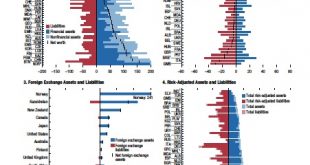Two recent articles critically reflect on the quality of journalism in German speaking news, specifically in Switzerland. In the NZZ, Stephan Russ-Mohl reports about a study according to which in Switzerland, only 42 professors out of a sample of 1100 are regularly interviewed; they provide about half of the publicized statements. (In total, there are about 5500 professors in Switzerland.) Eine Vielfalt wissenschaftlicher Stimmen gibt es in der Medienarena nicht: Von den 1100 der rund...
Read More »Public Sector Net Worth
In its recent Fiscal Monitor, the IMF provides estimates of public sector net worth. See also this previous post.
Read More »Public Sector Net Worth
In its recent Fiscal Monitor, the IMF provides estimates of public sector net worth. See also this previous post.
Read More »Conflicts of Interest at Bern’s Inselspital?
In the NZZ, Daniel Gerny and Simon Hehli report about potential conflicts of interest at Bern’s university hospital, the Inselspital. A cardiologist found evidence of negative health effects of in vitro fertilization, which the Inselspital offers. But unusually, the hospital’s PR department didn’t advertize the findings. The motivation to keep quiet, according to the PR department, was that the findings are of relevance also for other groups at the hospital, and that this would have to be...
Read More »Conflicts of Interest at Bern’s Inselspital?
In the NZZ, Daniel Gerny and Simon Hehli report about potential conflicts of interest at Bern’s university hospital, the Inselspital. A cardiologist found evidence of negative health effects of in vitro fertilization, which the Inselspital offers. But unusually, the hospital’s PR department didn’t advertize the findings. The motivation to keep quiet, according to the PR department, was that the findings are of relevance also for other groups at the hospital, and that this would have to be...
Read More »Negative Value Added of Switzerland’s Agricultural Sector
Farmers in Switzerland receive about CHF 2.7 billion in direct financial support annually. Total financial support by the federal and cantonal governments equals more than CHF 4 billion. But according to a report published by Zurich based think tank Avenir Suisse, this financial support constitutes just a minor part of the transfers from society at large to farmers, due to explicit and implicit subsidies, privileges, and—most importantly—negative externalities. A list of privileges...
Read More »Negative Value Added of Switzerland’s Agricultural Sector
Farmers in Switzerland receive about CHF 2.7 billion in direct financial support annually. Total financial support by the federal and cantonal governments equals more than CHF 4 billion. But according to a report published by Zurich based think tank Avenir Suisse, this financial support constitutes just a minor part of the transfers from society at large to farmers, due to explicit and implicit subsidies, privileges, and—most importantly—negative externalities. A list of privileges...
Read More »“Macroeconomics II,” Bern, Fall 2018
MA course at the University of Bern. Time: Wed 10-12. KSL course site. Course assistant: Lukas Voellmy. The course introduces Master students to modern macroeconomic theory. Building on the analysis of the consumption-saving trade off and on concepts from general equilibrium theory, the course covers workhorse general equilibrium models of modern macroeconomics, including the representative agent framework, the overlapping generations model, and possibly the Lucas tree model. Lectures...
Read More »“Macroeconomics II,” Bern, Fall 2018
MA course at the University of Bern. Time: Wed 10-12. KSL course site. Course assistant: Lukas Voellmy. The course introduces Master students to modern macroeconomic theory. Building on the analysis of the consumption-saving trade off and on concepts from general equilibrium theory, the course covers workhorse general equilibrium models of modern macroeconomics, including the representative agent framework, the overlapping generations model, and possibly the Lucas tree model. Lectures...
Read More »“Kosten und Nutzen eines Vollgeldsystems (Costs and Benefits of `Sovereign Money’),” ifoSD, 2018
ifo Schnelldienst 16/2018, August 23, 2018. PDF.
Read More » Dirk Niepelt
Dirk Niepelt


